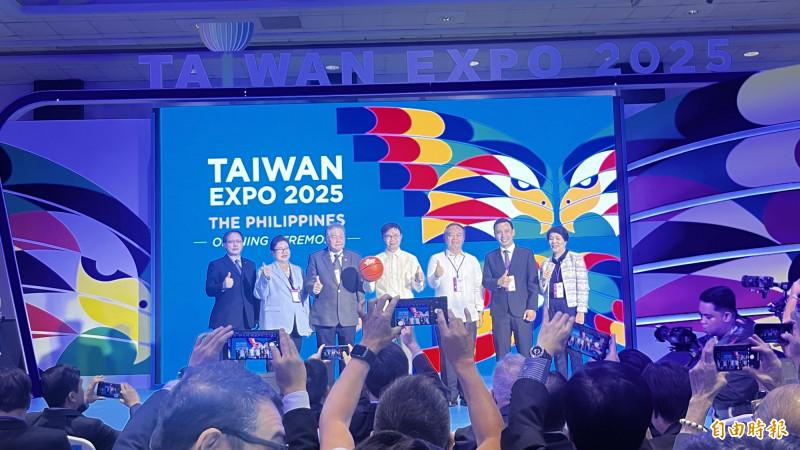A Taiwan trade fair yesterday opened in the Philippines, with organizers setting their sights on US$50 million in business opportunities.
More than 140 Taiwanese enterprises are participating in the three-day Taiwan Expo, said the government-sponsored Taiwan External Trade Development Council (TAITRA), which organized the event with the International Trade Administration.
The expo's themes are "Green and Sustainability," "Agritech and Aquatech," "Health and Wellness," "Smart Technology" and "Intelligent Lifestyle," the organizers said.

Photo: Liao Chia-ning, Taipei Times
The expo began with displays of freestyle basketball and Taiwanese street dancing, symbolizing cooperation between Taiwan and the Philippines, they said.
The opening ceremony was led by TIATRA chairman James Huang (黃志芳) and Wilson Tecson, a board member of the Manila Economic and Cultural Office.
Speaking to reporters after the ceremony, Huang said that the international trade landscape has changed significantly in the six years since the last Taiwan Expo in 2019.
Amid restructuring of global supply chains and growing geopolitical tensions, the Philippine government and business sector have been focusing more closely on Taiwanese technologies and solutions, he said.
In 2017 and 2019, the Taiwan Expo resulted in trade deals of more than US$50 million, Huang said, adding that the figure would be no less this year, enhancing economic ties between Taiwan and the Philippines.
The Philippines, Taiwan's nearest neighbor in Southeast Asia, has a population of 110 million people, indicating significant consumer power, he said, adding that it is attracting the attention of an increasing number of Taiwanese companies amid supply chain restructuring.
Meanwhile, Representative to the Philippines Wallace Chow (周民淦) said at the expo that the Philippine government has been pushing telecom infrastructure development, green energy, agricultural product processing and industrial zones.
These efforts are being made in tandem with Taiwan's development of its information and communications expertise, green technologies and smart manufacturing, Chow said.
He said he hoped that the two sides would share information on industrial development, creating a win-win situation.
Philippine Chamber of Commerce and Industry (PCCI) president Enunina Mangio said that the PCCI strongly supports efforts by Taiwan and the Philippines to establish a comprehensive and lasting partnership, which business leaders and PCCI members are encouraged to join.
The expo's Health and Wellness pavilion is promoting wider access to healthcare. It features international referrals, specialty health services, high-end health checks, artificial intelligence (AI) diagnosis, long-distance health monitoring, information and communications, and big data.
The Agritech and Aquatech pavilion highlights a comprehensive technology chain, from production to transportation and consumption.
It focuses on applications such as the Internet of Things and AI, and features cold chain logistics and refrigerated storage expertise, which TAITRA said would help to enhance the resilience and sustainability of the Philippine agricultural and fishery industries.
Economic ties between Taipei and Manila have grown over the past few years.
Last year, Taiwan was the Philippines' 11th largest trading partner with bilateral trade totaling US$6.71 billion, government data shows.
In the first seven months of this year, bilateral trade rose 8.5 percent from a year earlier, making Taiwan the Philippines' 10th largest trading partner, the data shows.

The manufacture of the remaining 28 M1A2T Abrams tanks Taiwan purchased from the US has recently been completed, and they are expected to be delivered within the next one to two months, a source said yesterday. The Ministry of National Defense is arranging cargo ships to transport the tanks to Taiwan as soon as possible, said the source, who is familiar with the matter. The estimated arrival time ranges from late this month to early next month, the source said. The 28 Abrams tanks make up the third and final batch of a total of 108 tanks, valued at about NT$40.5 billion

Two Taiwanese prosecutors were questioned by Chinese security personnel at their hotel during a trip to China’s Henan Province this month, the Mainland Affairs Council (MAC) said yesterday. The officers had personal information on the prosecutors, including “when they were assigned to their posts, their work locations and job titles,” MAC Deputy Minister and spokesman Liang Wen-chieh (梁文傑) said. On top of asking about their agencies and positions, the officers also questioned the prosecutors about the Cross-Strait Joint Crime-Fighting and Judicial Mutual Assistance Agreement, a pact that serves as the framework for Taiwan-China cooperation on combating crime and providing judicial assistance, Liang

A group from the Taiwanese Designers in Australia association yesterday represented Taiwan at the Midsumma Pride March in Melbourne. The march, held in the St. Kilda suburb, is the city’s largest LGBTQIA+ parade and the flagship event of the annual Midsumma Festival. It attracted more than 45,000 spectators who supported the 400 groups and 10,000 marchers that participated this year, the association said. Taiwanese Designers said they organized a team to march for Taiwan this year, joining politicians, government agencies, professionals and community organizations in showing support for LGBTQIA+ people and diverse communities. As the first country in Asia to legalize same-sex

MOTIVES QUESTIONED The PLA considers Xi’s policies toward Taiwan to be driven by personal considerations rather than military assessment, the Epoch Times reports Chinese President Xi Jinping’s (習近平) latest purge of the Chinese People’s Liberation Army (PLA) leadership might have been prompted by the military’s opposition to plans of invading Taiwan, the Epoch Times said. The Chinese military opposes waging war against Taiwan by a large consensus, putting it at odds with Xi’s vision, the Falun Gong-affiliated daily said in a report on Thursday, citing anonymous sources with insight into the PLA’s inner workings. The opposition is not the opinion of a few generals, but a widely shared view among the PLA cadre, the Epoch Times cited them as saying. “Chinese forces know full well that